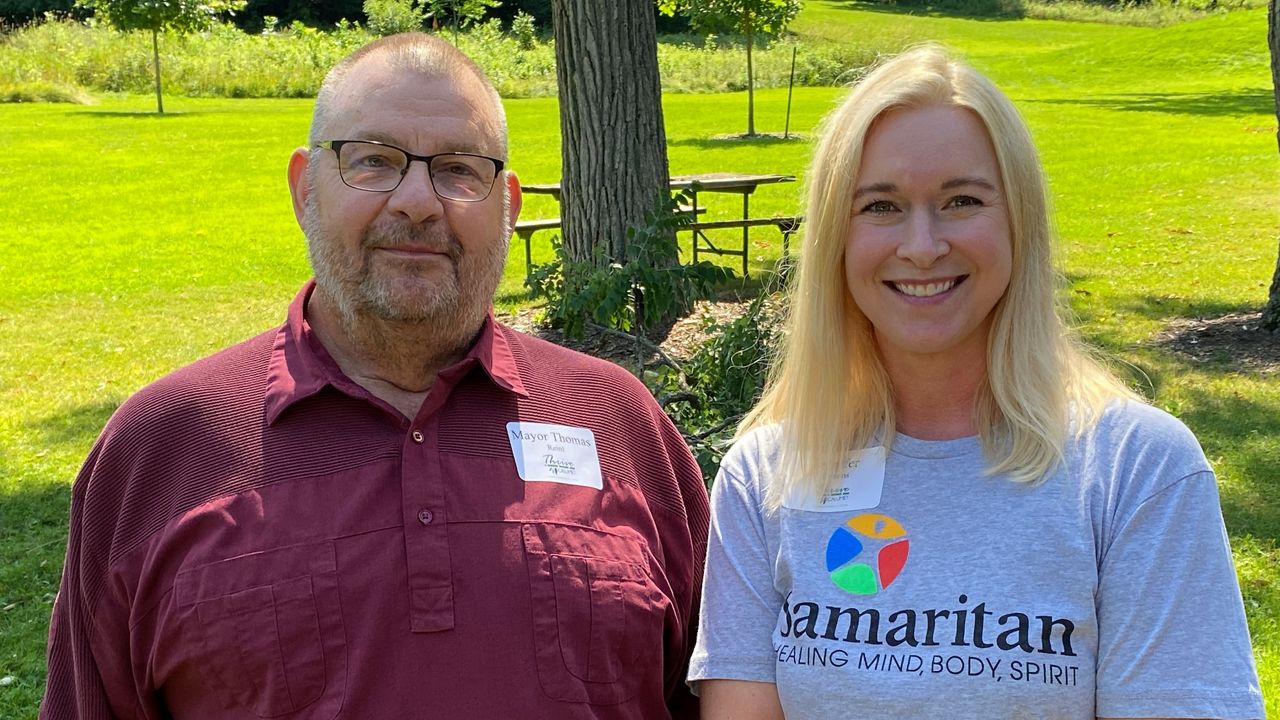HILBERT, Wis. — The student was in trouble. The kind that, in the aftermath, friends, family and loved ones wipe away a million tears as they anguish over how they missed the signs.
What You Need To Know
- THRIVE Calumet is a school-based mental health program serving five school districts in Calumet County, Wisconsin
- In year one of the two-year program, there were 1,011 screens offered and 807 were completed
- A total of 310 students screened positive for mental health concerns, and 156 received 651 counseling sessions
But this student was luckier than they even knew. They had a place, and a person, to share the trauma that was raging inside them.
“A student was actively thinking about suicide,’’ said Gloria Allhiser, the School-Based Mental Health Counseling Coordinator at Samaritan, a Menasha-based counseling center. “Was actively planning when they were going to attempt to take their life."
“And we were able to screen that and meet with that student. They disclosed this to their therapist, and they were able to get connected with emergency health care to stabilize and prevent that child from taking their life. Their life, literally, saved.”
Saved by a pilot program called THRIVE Calumet, a mental health program involving five Calumet County school districts — Brillion, Chilton, Hilbert, New Holstein and Stockbridge.
“So, this has been a game changer for our community,’’ said Curt Meshak, principal of the Stockbridge School District. “The services that THRIVE Calumet and Samaritan has brought to Stockbridge would not have been possible prior to this collaboration. Being a small school district of roughly 200 kids, these resources were not obtainable. … There just wasn’t money in the budget for it.”
Various sources contributed monetary support, but the biggest was a $231,544 grant from the Basic Needs Giving Partnership within the Community Foundation for the Fox Valley. On Tuesday, several key players gathered at the Calumet Country Park Lodge to give a progress report on the first year of the two-year program.
Without question, the biggest takeaway was THRIVE Calumet has positively influenced everyone it has touched.
“The term mental health, being like a household name,’’ said Lori Muench, Director of Pupil Services in Chilton, regarding the program’s impact.
“In our hallways, students helping each other, students talking about what sources of strength do you have? What did you do when you experienced this? Have you talked to your parents about this? The students talking to each other, to me, that’s the success that they’re living in everyday. It’s just what we do. That’s success.”
The program is succeeding because it has removed barriers.
“What our team does is when we offer the screening right in the classroom,” said Jen Parsons, Wellness Screen Director at Samaritan, “we’re able to then meet with any student following the screen that has been identified as a positive screen or with those possible concerns. We meet with that student and care for that family for up to 90 days, ensuring that they get access to mental health care.
“And so, that’s why it’s really important to have counseling right in the schools, because a lot of those barriers are initially removed right away. That transportation barrier being a lot of what is causing families to say, ‘No, not right now. We’ll wait until we get that figured out.’ We work with families through their health insurance, we work with them on a place that’s a right fit for them, a counselor that’s the right fit for them and follow them through that first appointment, making sure that their needs are being met.”
Jennifer Konen and Abbie Pospychala, representing the Hilbert School District, said they also have seen the life-saving benefits of the program. But it goes beyond that.
“Kids that are regulated and calm and safe are open to learning,’’ said Allhiser. “When they have frustration tolerance skills, they can keep pushing through a new task, instead of giving up. And so, this is part of that. It supports overall wellness but it feeds their ability to succeed academically.”
THRIVE Calumet also works to help everyone connected to the student, including faculty, staff and parents. It is breaking down stigmas on all fronts.
“And I’ve seen that change in how our students, our staff and families accept the services that are provided for them,’’ said Meshak.
Derek McDermott, a member of the Chilton Area Community Foundation that played a key role in getting this program launched, is certain there are benefits to be reaped that will never be known.
“One thing that is success, that you’ll never discover, and that’s that kid who doesn’t go off the deep end, five, 10 years later,’’ he said. “You can see the results of some of those deep downfalls with the violence in society, with shootings. Hopefully you won’t know, but you don’t need to know. But to me, that is a big part of the success of a program like this, too.”
Everyone in attendance wants to see the program continue but, according to Chilton Mayor Tom Reinl, the funding will run out after this school year.
“Mental illness has been, and continues to be, a silent, secret pandemic that has existed for centuries,’’ said Reinl.
Speaking with the educators and counselors, he said one thing struck him.
“When I was taken aback, it was that the parents are accepting help,’’ he said. “I didn’t expect that. I expected them to walk away.
“This program has got to be sustainable from now until the end of my time. My goal is to come up with a program to sustain this program for however long it’s needed. And I know it will be needed beyond my time.”
Story idea? You can reach Mike Woods at 920-246-6321 at: michael.t.woods1@charter.com



